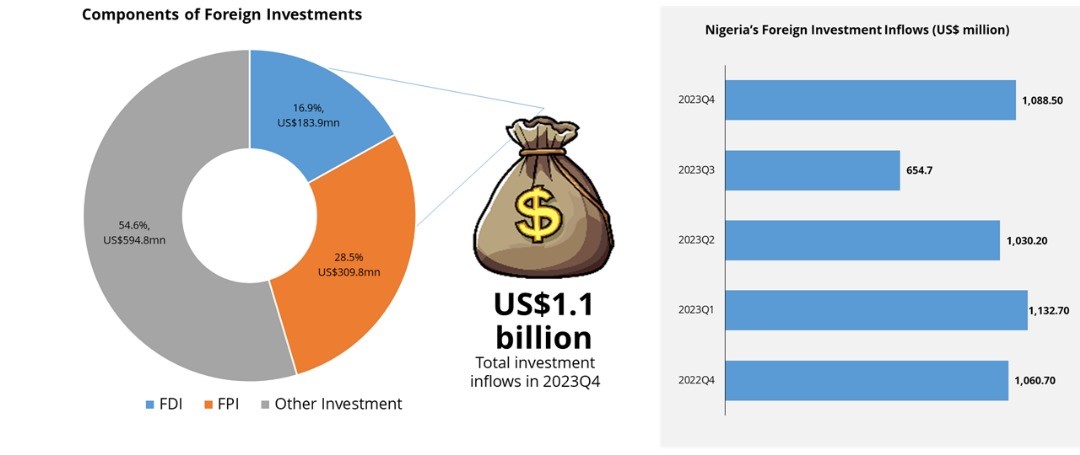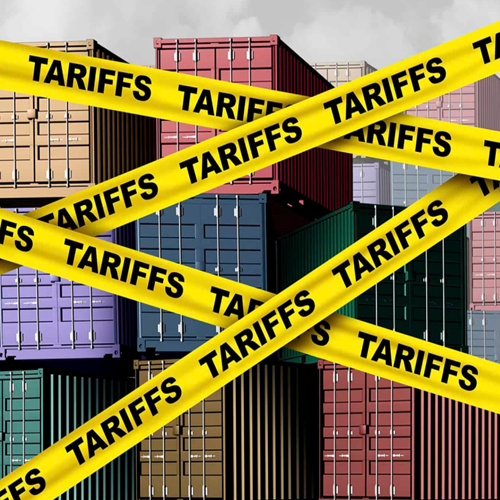Posted Tue, Feb 20, 2024 6:38 PM
Foreign Investment Inflows into Nigeria weakens in 2023

Nigeria’s foreign investment inflows fell by 26.7 percent to US$3.9 billion in 2023 from US$5.3 billion in 2022. The decline was orchestrated by the consecutive drop in foreign investment inflows in the first three quarters of 2023 due to political risks and elevated production costs. Consequently, foreign-owned subsidiaries, including Nestle, Guinness, Airtel Africa, and MTN Nigeria, have lost over N900 billion to currency devaluation [1]. However, the implementation of pro-market reforms – fuel subsidy removal and exchange rate harmonisation - reverted the trend in the fourth quarter of 2023 as capital importation rose to US$1.1 billion. Nonetheless, the overall drop in foreign investment inflows reflects the unfavourable investment climate, which has doused investors’ confidence in the Nigerian economy.

Data: NBS; Chart: NESG Research
Moreover, the increase in capital importation in 2023Q4 was primarily attributed to the Apex Bank’s giant strides in gradually clearing the foreign exchange (FX) backlogs, which improved investors’ confidence. Furthermore, the improvement in the foreign investment inflows in 2023Q4 is traceable to the surge in Foreign Direct Investment (FDI) to US$184 million in 2023Q4 from US$84.2 million in 2022Q4. Correspondingly, the share of FDI in total investment inflows jumped to 16.9 percent in 2023Q4 relative to its level in 2022Q4 (7.9 percent). Similarly, Foreign Portfolio Investment (FPI) rose by 8.6 percent (year-on-year) to US$309.8 million in 2023Q4. However, Other Investments – entirely dominated by foreign loans – fell to US$594.8 million in 2023Q4 from US$691.2 million in 2022Q4.
Meanwhile, FDI fell by 19.4 percent to US$377.4 million in 2023 from US$468.1 million in 2022. This is not unconnected with the divestments by major multinational oil and manufacturing companies due to an unfavourable business environment. Specifically, Shell reached a financial close to selling its onshore oilfields in Nigeria at US$2.4 billion [2]. Similarly, a British Pharmaceutical and Biotechnology Company, GlaxoSmithKline Consumer Nigeria, exited the country after 51 years of operation. The other multinational firms that divested from Nigeria in 2023 include Procter & Gamble (an American multinational consumer goods company), Unilever Nigeria (home care and skin cleansing division), Sanofi, and Bolt Foods.
The mass exodus of these firms is expected to have a detrimental effect on the Manufacturing sector, which is currently struggling with growth. The sector expanded by 0.5 percent in the first three quarters of 2023, relative to a 1.9 percent contraction recorded in the corresponding period of 2022. Similarly, the oil and gas sector has suffered prolonged contraction since 2020. Furthermore, the weak inflow of foreign capital has implied a shortage in FX inflow and, by extension, further exchange rate depreciation. It is, therefore, imperative for the government to initiate strategies to incentivise foreign capital inflows into the country.
Footnotes
[1] See, https://blueprint.ng/airtel-mtn-others-accumulate-over-n900bn-forex-loses-to-naira-devaluation/
Find a blog post
Latest Releases

NESG Hosts Fireside Chat with Pr .. Read
1 day ago

Strategic Implications of US Rec .. Read
1 week ago

Development as Attitude: A Natio .. Read
3 days from now
